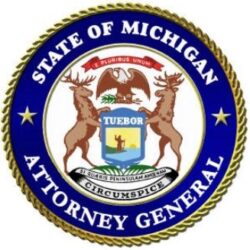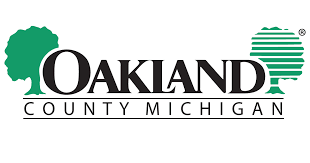
Attorney General Recaps Busy 2020

Media Contacts:
Courtney Covington
(c) 517-290-1560
FOR IMMEDIATE RELEASE:
Wednesday, Dec. 30, 2020
Michigan Attorney General Nessel Recaps Busy 2020
LANSING – Michigan Attorney General Dana Nessel’s office has been busy the past 12 months, negotiating historic settlements, filing significant lawsuits, investigating serious threats and protecting consumers from an array of scams and deceptive business practices.
As 2020 comes to a close, the boisterous election cycle very likely remains fresh in the collective conscious, but other significant events – such as the lawsuit filed against major PFAS manufacturers or the $80 million settlement reached in Doe et al v. Michigan Department of Corrections – also rank among milestone events coming out of the Michigan Department of Attorney General in 2020.
“This year has been marked by a multitude of actions taken by my office and on behalf of other state departments, and I am extremely proud and grateful for the exemplary work performed by everyone at the Michigan Department of Attorney General,” Nessel said. “While COVID-19 has presented logistical complications and new difficulties in enforcing our laws, my staff has risen to meet those challenges squarely in pursuit of justice on behalf of the people of this state. I am encouraged by the accomplishments we have achieved in 2020 and eagerly anticipate furthering those efforts as we look forward to 2021.”
A brief round-up of some notable events follows:
Important Investigations
- Wolverine Watchmen – Cases remain pending in court for the eight men charged in connection to an alleged domestic terrorism plot that involved storming the Michigan Capitol building and kidnapping elected officials, including Gov. Gretchen Whitmer. Four of the defendants are scheduled to appear in court in February, with three more scheduled to appear in March. The eighth defendant – Brian Higgins – is awaiting extradition in Wisconsin. Court dates for Antrim County defendants can be found online at the 86th District Court’s website, while the Jackson County 12th District Court also provides that information online for defendants there.
- The Base – Charges were filed in late October against the self-proclaimed leader of The Base – a national white supremacist group with violent ideologies – and an associate of the gang, following an investigation by Michigan State Police and the Federal Bureau of Investigation. A probable cause hearing for both defendants in Washtenaw County 14A-3 District Court took place Dec. 17 and was adjourned until 9 a.m. Feb. 4.
- Clergy Abuse – The Department’s investigation into clergy abuse hit the two-year mark in October, with 11 men seeing charges in that time span. The Attorney General’s office continues to review the 220 boxes of paper documents and more than 3.5 million digital documents seized from the state’s seven Catholic dioceses in 2018. As of late September, the office’s Clergy Abuse Investigative Team had reviewed more than 2.24 million of the digital documents and 142 boxes of paper documents.
- Public Integrity – Multiple public officials were subjects of investigations conducted by the Attorney General’s office, including Macomb County Prosecutor Eric Smith and Chief Assistant Prosecutor Benjamin Liston. The office also reviewed cases involving alleged misconduct by police officers in Saginaw, Washtenaw and Jackson counties, along with a former Grand Traverse County jail administrator and technicians who were contracted to test and service breathalyzers used by law enforcement. The case against Southfield Clerk Sherikia Hawkins, who was accused in 2019 of election fraud, is also continuing in court. She was bound over to Oakland County Circuit Court on six felony counts in June. Several other cases were reviewed by the Attorney General’s office after requests were made by county prosecutors to avoid conflicts of interest.
Important Settlements
- Flint Civil Litigation – The largest settlement in the State of Michigan’s history was submitted to the court for preliminary approval after being announced in August. The State and other defendants have agreed to contribute $641.2 million to settle the litigation that was filed after the city of Flint switched its public water supply to the Flint River in 2014. Judge Judith Levy of the United States District Court for the Eastern District of Michigan reviewed the agreement as part of a motion for preliminary approval, and may issue a ruling on whether the settlement meets certain legal standards in January.
- Doe et al v Michigan Department of Corrections – An $80 million settlement was announced in February for the class-action lawsuit filed by 1,300 youthful prisoners. The juveniles alleged they were victims of sexual assaults, and various other harms, while they were housed in adult prisons under the custody of the MDOC after being charged, convicted and sentenced as adults under Michigan law.
- Hill v. Whitmer – In conjunction with the Michigan Department of Corrections, the Attorney General’s office settled this class action arising out of the resentencing of juveniles sentenced to mandatory life-without-parole sentences (LWOP) in accordance with the U.S. Supreme Court’s 2012 decision in Miller v. Alabama. Under Miller, offenders who were sentenced to LWOP were entitled to a hearing designed to consider their youth at the time of the offense along with other factors to determine if a LWOP was appropriate. According to the U.S. Supreme Court, a LWOP would only be appropriate in the most extreme cases. The Michigan Legislature enacted a series of statutes that provided for specific minimum terms if the trial court did not resentence the offender to a LWOP and also prohibited the application of good time and disciplinary credits. The Hill class challenged the statute prohibiting the application of credits and also sought programming for those offenders waiting for resentencing and to set a schedule for the Miller hearings to be completed. On Nov. 6, the court approved a settlement that provided for the Hill class members to be eligible for programming, a timeline to notify the trial court that the prosecutors were ready to proceed with the Miller hearings, and for the Attorney General to provide assistance to the local prosecutors in charge of the resentencing hearings.
Important Lawsuits
- PFAS – The Attorney General’s office in January filed suit against several major manufacturers of the “forever chemicals” PFAS. The lawsuit seeks damages, past costs, and remediation for PFAS contamination as a result of the chemicals’ use in manufacturing. The case survived multiple motions to dismiss, and in August the Attorney General’s office took legal action seeking damages, past costs, and remediation for PFAS contamination from firefighting foam known as AFFF (aqueous film-forming foam). All of these cases remain pending in court. In a related effort, the Attorney General’s office also reached a settlement with Wolverine Worldwide Inc., which requires the company to pay $69.5 million to extend municipal water to more than 1,000 properties, among other measures, to resolve a 2018 lawsuit that accused the company of contaminating residential drinking water with PFAS compounds.
- Opioids – In late 2019, Attorney General Nessel filed suit against Cardinal Health Inc., McKesson Corp., AmerisourceBergen Drug Corp., and Walgreen Co. for their roles in distributing massive quantities of opioids in Michigan. In November 2020, the case survived an attempt to dismiss by the defendants and the court ruled that the AG’s arguments based on violations of Michigan’s Drug Dealer Liability Act could proceed. That case remains in litigation in Wayne County Circuit Court.
- Enbridge Line 5 – Nessel continued her lawsuit that was filed in 2019 against Enbridge in Ingham County Circuit Court that seeks the permanent shutdown of the Straits Pipelines, based on the public trust doctrine, the common law of public nuisance and the Michigan Environmental Protection Act. In November, the Attorney General’s office also filed another lawsuit against Enbridge on behalf of Gov. Gretchen Whitmer and the Michigan Department of Natural Resources seeking to revoke and terminate the easement granted by the State in 1953 that allows Enbridge to operate its dual pipelines on the bottomlands of the Straits of Mackinac.
- Antitrust – In early December, Attorney General Nessel and 47 other state attorneys general filed a lawsuit against Facebook alongside a separate action by the FTC for anticompetitive behavior – including the purchases of competitors like Instagram, to protect its monopoly. Also in December, Attorney General Nessel joined a lawsuit by the U.S. Department of Justice alongside California and Wisconsin against Google for anticompetitive behavior– including entering into exclusionary business agreements to shut out competitors, to protect its monopoly.
- CARES Act Litigation – In July, Attorney General Nessel and California Attorney General Xavier Becerra led a coalition in a court action against U.S. Education Secretary Betsy DeVos and her attempt to divert more than 16 million dollars in COVID-19 relief funding from public schools in Michigan. Judge James Donato – of the U.S. District Court Northern District of California – on Nov. 9, approved a permanent injunction, formally closing the case on DeVos’s efforts to rewrite a section of the Coronavirus Aid, Relief and Economic Security (CARES) Act. Following his order to grant the permanent injunction, Judge Donato entered a judgment in favor of all plaintiffs.
Consumer Protection
- Robocalls – In an effort to strengthen the industry’s collaboration with government on robocall enforcement, Attorney General Nessel’s office in early May led a bipartisan coalition of 52 attorneys general in calling on USTelecom and its Industry Traceback Group (ITG) to bolster technological capabilities to improve enforcement against illegal robocallers. The coalition’s letter was cosponsored by Ohio Attorney General Dave Yost. In June, Attorney General Nessel joined six other states in filing a lawsuit against a robocall operation out of Texas accused of blasting Michigan residents and the country with billions of illegal robocalls. In August, the Attorney General’s office announced a settlement agreement requiring California-based Voice Over Internet Protocol (VoIP) voice service provider, MODOK LLC, to exit the VoIP telecom industry and begin winding down its operations. This agreement marked the first time a state attorney general has been able to permanently shut down a VoIP service provider and bar its ownership from working in the industry. In September, the office finalized a settlement with All Access Telecom Inc. – a major Texas-based VoIP service provider to implement strict, first-of-their-kind measures aimed at collaboratively stopping illegal robocalls.
- Price-gouging – The COVID-19 pandemic led to numerous reports of price-gouging practices by retailers, and the Attorney General’s office remains active in the enforcement of the Michigan Consumer Protection Act to hold businesses and sellers accountable. The most recent example of this is an Assurance of Voluntary Compliance agreement the office reached with Smokehouse Distribution, an Oakland County business that was selling excessively high-priced face masks to consumers.
- Scams and Consumer Alerts – The Attorney General’s office issued a number of consumer alerts in 2020 to keep residents aware of the potential threats they could fall victim to. A variety of scams surfaced this past year, with one notable example being door-to-door scammers who were posing as government officials offering information on stimulus checks or unemployment benefits at the beginning of the COVID-19 pandemic. Nessel also offered people advice during the 20 Days of Scams consumer protection series, which featured informational videos, a toy guide and more during the holiday season.
Election Integrity and Safety
- Lawsuits – Prior to the election, Attorney General Nessel sued the U.S. Postal Service and Postmaster General Louis DeJoy to ensure mail-in ballots were being properly processed and delivered after operational changes instituted by the USPS could have resulted in a significant number of mail-in ballots not being counted. A federal judge stopped those operational changes from continuing, ensuring mail-in ballots would be handled appropriately by the USPS. In defense of the procedures undertaken by Secretary Benson and election officials, Attorney General Nessel’s office helped defend against the numerous legal challenges filed, which made unverified and unsubstantiated claims of widespread fraud. While some cases are ongoing, an overwhelming majority have been dismissed, withdrawn or otherwise failed in the courts. In one case, the state of Texas sued Michigan and other battleground states in an attempt to overturn election results. The lawsuit fell short of being heard in the U.S. Supreme Court.
- Security – While there were a number of attempts to thwart the will of the people, the Attorney General’s office was ready to defend democracy at every turn. One highlight involves a series of robocalls that targeted Detroit-area voters seeking to intimidate them from participating in the election by use of mail-in ballots. The Attorney General’s office launched an investigation and charged Jack Burkman and Jacob Wohl with multiple felonies. They have since been bound over on all four counts and the case remains pending in Wayne County Circuit Court. The Attorney General has also taken action to investigate the few credible reports of fraud received and prosecute those found to have occurred, while also working to investigate threats made to election officials.
- Education – Working in tandem with Secretary of State Benson to ensure a safe and secure election, Attorney General Nessel’s office aggressively protected the integrity of the democratic process while informing the public of their voting rights by hosting town hall events, informational calls and more.
“I am thoroughly impressed and equally grateful for the fair and responsible journalists who have covered these many important topics and, considering the challenging circumstances, have informed their readers and viewers with accurate and reliable information,” Nessel said. “Throughout the ongoing pandemic and turbulent election cycle, many Michigan journalists have been able to sift through the misinformation and disingenuous spin to find the truth, and they have upheld their role as the people’s watchdog.”
More information about the Michigan Department of Attorney General can be found on its website and by browsing the news releases posted online.
For more information on specific cases and actions, contact the Attorney General’s media email.




